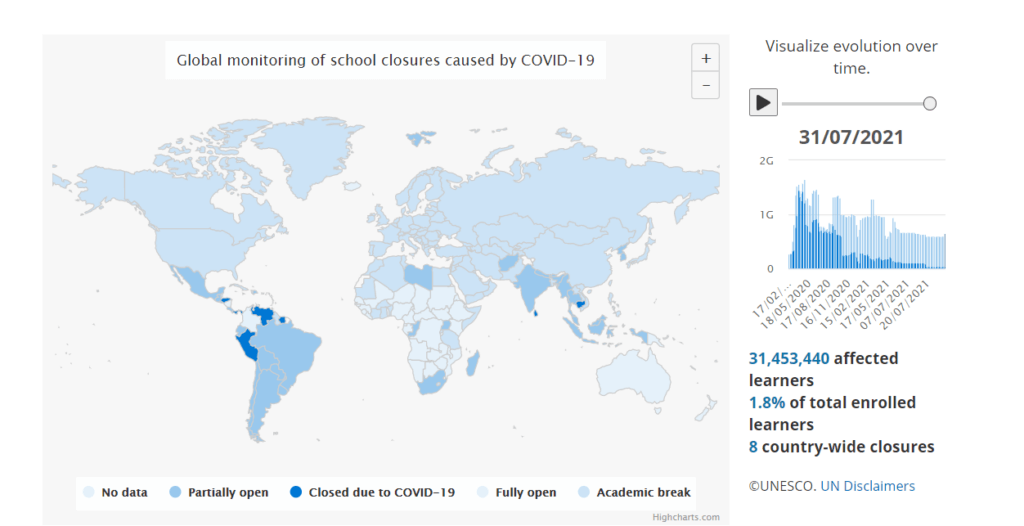Chegando ao final do período de férias no Brasil, em julho, o início de um novo semestre letivo traz novamente a discussão sobre se a retomada das aulas presenciais é segura devido ao contexto da pandemia de covid-19.
O Fundo das Nações Unidas para a Infância (Unicef), a Organização das Nações Unidas para a Educação, a Ciência e a Cultura (Unesco) e a Organização Pan-Americana da Saúde (Opas/OMS) divulgaram um manifesto defendendo a reabertura segura das escolas no último dia 7 de julho, ao final do Seminário “Reabertura Segura das Escolas” realizado pelas Agências em formato online. O texto cita pesquisa recente realizada pelo Instituto Inteligência em Pesquisa e Consultoria (Ipec) para o Unicef, indicando que dois em cada dez estudantes brasileiros estão frequentando atividades escolares presenciais. “Quando analisamos esse dado por classe social, as diferenças são enormes. Enquanto 40% dos filhos da classe A podem ter acesso a aulas presenciais, nas classes D e E, eles são somente 16%. A pandemia aprofundou o fosso das nossas desigualdades, e na educação o impacto é ainda maior”, diz o documento.
O Manifesto explica que a educação é um direito fundamental e coloca a preocupação das Agências da ONU com o impacto do fechamento das escolas no aprendizado e desenvolvimento das crianças e adolescentes, além das consequências para a sua saúde mental, nutrição e proteção.
O texto também menciona o mapa de monitoramento interativo da Unesco, segundo o qual, em âmbito mundial, as escolas estiveram fechadas (total ou parcialmente) por 5,5 meses (22 semanas), em média. Na maioria dos países da América Latina, a média fica acima de 41 semanas. No Brasil, ela chega a 53 semanas. “E isso, embora as escolas devam ser as últimas instituições a fechar e as primeiras a abrir – como ocorre em qualquer emergência humanitária”, alertam.
No Brasil, as escolas estão “parcialmente abertas”. Segundo o mapa interativo da Unesco, os dados do dia 18 de julho de 2021 (última data disponível antes das férias escolares) indicam que quase 53 milhões de estudantes brasileiros foram afetados pelo fechamento das escolas durante a pandemia de covid-19. Ainda de acordo com o mapa da Unesco, países como Canadá, Estados Unidos e Alemanha também seguem o mesmo regime, com as escolas “parcialmente abertas”. Já Inglaterra, França, Portugal, Itália e Espanha são exemplos de locais onde as escolas estão totalmente abertas.

Reabertura
Ao mesmo tempo em que defende a reabertura das escolas, o Manifesto da Unesco, Unicef e Opas/OMS deixa claro que essa atitude deve ser acompanhada de cuidados e protocolos sanitários que garantam a segurança da comunidade escolar. “Dentro da escola, é essencial adotar todos os protocolos de prevenção à Covid-19, como uso de máscaras (de acordo com o recomendado para cada idade), higienização das mãos, distanciamento social, etiqueta respiratória, ventilação dos espaços, limpeza e desinfecção dos ambientes, espaçamento das mesas e organização das turmas”, diz o texto.
Além dos protocolos, o posicionamento das Agências enfatiza que o ensino híbrido também pode ser incluído nessa retomada e que a busca ativa dos estudantes é “urgente”. O Manifesto lembra ainda que é fundamental garantir a vacinação dos trabalhadores da linha de frente de serviços essenciais como saúde, educação e assistência social. “Em agosto, começa um novo semestre letivo. É preciso agir agora e reabrir as escolas em segurança para garantir o direito de cada criança, adolescente e jovem brasileiro a uma educação de qualidade”, finaliza o documento.
Testagem
O Cube Scan, solução para diagnóstico da covid-19 em desenvolvimento na Radiolife, foi pensado para contribuir com a criação de um hábito de testagem em massa e frequente. Por ser um aparelho portátil, de simples manuseio e rápido (o resultado sai em dez segundos), poderia ser utilizado diariamente na entrada das escolas, por exemplo. A mesma ideia poderia ser adotada em outras situações como aeroportos e estádios ou qualquer outro ambiente fechado, antes da entrada dos frequentadores. O Cube Scan está em desenvolvimento na Radiolife e, assim que receber as autorizações das agências reguladoras, será iniciada sua comercialização. Saiba mais aqui.
